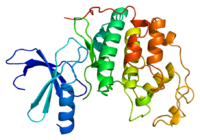
Photo from wikipedia
Simvastatin (SIM), a widely used cholesterol‐lowering drug, also exhibits tumor‐suppressive potentials in several types of malignancy. Colorectal cancer (CRC), the third most common malignant neoplasm, accounts for the second most… Click to show full abstract
Simvastatin (SIM), a widely used cholesterol‐lowering drug, also exhibits tumor‐suppressive potentials in several types of malignancy. Colorectal cancer (CRC), the third most common malignant neoplasm, accounts for the second most leading cause of cancer‐related deaths worldwide. In the present study, we investigated the anticancer effects of SIM on CRC using primary cancer cells lines (CPs: CP1 to CP5) isolated from five Taiwanese colorectal cancer patients as a model for colorectal cancer. We treated all five CPs with SIM for 24–72 hr and observed the respective cell viability by an MTT assay. SIM increased DNA content of the G1 phase, but did not induce apoptosis/necrosis in CPs as shown by flow cytometry with propidium iodide (PI)/annexin V double staining and PI staining. The expression of G1 phase‐related proteins was analyzed by RT‐PCR and Western blotting. SIM suppressed cell growth and induced cell cycle G1‐arrest by suppressing the expression of CDK4/cyclin D1 and CDK2/cyclin E1, but elevating the expression of glycogen synthase kinase 3β in CPs. Our findings indicate that SIM may have antitumor activity in established colorectal cancer.
Journal Title: Journal of Cellular Physiology
Year Published: 2018
Link to full text (if available)
Share on Social Media: Sign Up to like & get
recommendations!